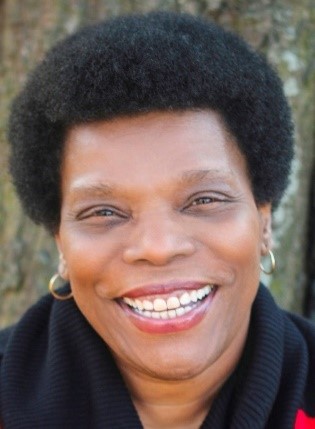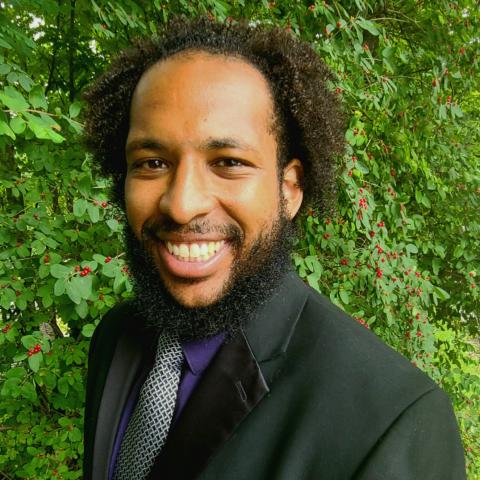
As conversations about the energy transition away from fossil fuels become increasingly important (and time-sensitive), some experts in environmental policy aren’t just worried about the conversations themselves. They’re worried about who has a seat at the table — and who doesn’t.

On November 8, at “Building a Just Foundation for Our Energy Transition,” a few of these experts — Sherri White-Williamson, Environmental Justice Policy Director at the NC Conservation Network; Josh McClenney, the North Carolina Field Coordinator at Appalachian Voices; and J. Spenser Darden, the Assistant Dean for Diversity and Inclusion at Duke’s Sanford School of Public Policy — spoke about this and other issues. Thomas Klug, a Research Associate at the Duke Energy Access Project, moderated the panel, which was put together by the Sanford Energy & Environment Club.
Klug asked the panelists to define what a “just transition” really means in the context of the panelists’ work, and whether it differs from a diverse and inclusive transition.

McClenney answered that a just transition entails recognizing that Black, brown, and indigenous communities, as well as low socio-economic status individuals, have historically faced the worst effects of fossil fuel economies. Living in the “physical and economic traction zones,” they’re the ones that lose jobs — like coal miners, in the case of McClenney’s work with Appalachian Voices.
However, where a diverse and inclusive transition involves “getting people to the table,” just policies will actually reflect the conversations had at the table. An unjust transition, McClenney said, is one where “people clap themselves on the back for doing such a great job having these diverse, inclusive discussions — then make policies that work against their participants.” Ensuring inclusion for communities that have historically been excluded is important, but it’s equally important to make sure the resulting policies are actually inclusive.

White-Williams agreed with McClenney — inclusion should never end at “checking the box.” The goal should be to incorporate the input of marginalized voices into resulting policy. White-Williams also added that fairness, while not necessarily guaranteed by diversity and inclusivity, is a key part of a just energy transition.
Spenser stressed the need to move away from “extractive, colonial” ways of thinking about energy and who makes up society, and to instead incorporate indigenous ways of thinking. He stated that diversity and inclusion is reactive: people realize flaws in the way they’ve built something and try to address it later by incorporating new elements. A just system, on the other hand, is built to be “for and by” communities that have been excluded from the very start.
Klug asked the panelists to recount some of the ways they’ve seen organizations, utilities, and decision makers putting the processes required for a just transition into practice.
McClenney spoke of revelations from the onset of COVID-19 in March 2020. Preventing utility shutoffs became critically important: people were losing jobs or forced to stay at home. They couldn’t come up with the money to pay their utility bills. While fighting utility shutoffs with Appalachian Voices, he saw a group of Knoxville organizations, including Knoxville Water and Energy for All, bringing attention to the fact that the shutoffs were not just a COVID problem. For some Black and brown communities, McClenney said, “keeping the lights on had always been an issue.” These grassroot groups’ advocacy expanded beyond the pandemic: they wanted energy and water recognized as human rights.
Klug asked the panelists how they feel about President Joe Biden’s performance with regard to just transitions in the energy sector — specifically, his January executive orders and recent bipartisan $1.2 trillion infrastructure bill.
White-Williams cited a major concern with Biden’s policies: they don’t give enough attention to rural issues. In Sampson county here in North Carolina, massive hog farms overwhelmingly surround communities of color. North Carolina’s new Farm Act will allow Smithfield Foods to build a system to trap methane from hog waste to be processed and eventually used as renewable electricity. But residents living near hog farms already experience toxic water, unbearable stench, and heightened risk of other diseases, and this system would likely make the problem even worse. It’s a textbook example of an unjust energy transition. That’s why environmental and civil rights organizations have asked the EPA to intervene — to no avail, at least thus far. (White-Williams is featured in this article about the current state of affairs.) “Rural America is suffering,” White-Williams said. She wants to see federal agencies using their power to ensure a just energy transition.
McClenney echoed White-Williams’ concern about hog farms, adding that deaths have resulted from providing workers with limited information about the conditions they would be working in — especially those who don’t speak English and whose undocumented status puts them in a vulnerable position.
On a different note, he thinks Biden’s expansions to Broadband and clean water are a step in the right direction. He stated that with North Carolina’s House Bill 951, which requires the Utilities Commission to cut emissions by 70% by 2030 (even more ambitious than Biden’s executive order, which seeks to cut US emissions in half by 2030), “there are opportunities right now to effect positive change — we just have to do a good job.” It’s about how we get to that carbon reduction goal.
Klug asked how people at universities — faculty, students, and staff alike — can contribute to this work in policy and in advocacy.
White-Williams told the audience to recognize that “having a degree does not make you an expert when you walk into these communities.” Community members have lived experience: they can tell policymakers and activists what they need, not the other way around. Change should be a partnership, and so should research: “Academics have a research question before they’ve even spoken to anyone.” Instead, “listen and learn from the people who have been there all their lives.”
Spenser invited the audience to think about “who the real experts are” in unique and different ways. Institutions like Duke are often separate from the communities they inhabit, serving as a sort of beacon on the hill. “We need to invert this paradigm,” he said.
McClenney added to Spenser’s criticism of schools like Duke, who “throw food out every day and hold dorm rooms empty during the summer while people go hungry and unhoused.” What’s needed is a fundamental reimagination of the university’s relationship to the community it inhabits. He also added to White-Williams’ point about research: it can be merely “another type of extraction” if not carried out in a just manner.
Klug asked the panelists whether we need to assess the impacts of energy policy differently through the lens of research.
McClenney flagged the words “affordability” and “reliability” in energy research, asking the audience to consider who that applies to. Affordability is not just about how rates compare to New York City or California, but whether someone has to forego insulin or go hungry in order to make a payment. By thinking through these words and what they really mean, we can “begin to understand impacts on a deeper level.”
Spenser implored researchers to use an intersectional lens: instead of considering economic impact and efficiency in isolation, to consider the way in which policies “contribute or ameliorate historic disparities.” In order to truly measure impact, efficacy, and outcome, researchers must be “historically aware and community invested.”
White-Williams agreed with McClenney and Spenser, asking researchers to consider whether policies are a “band-aid or a true fix.” She cited North Carolina’s Weatherization Assistance Program, which allocates tens of millions of dollars toward fixing “patched-up” homes that may have serious underlying problems. She wonders whether it may be better to simply spend the money on programs to place people in housing that is “actually livable.”
Klug opened the panel to questions. One audience member asked the panelists what concrete steps they recommend in order to “harness the power of diversity.”
White-Williams reiterated the importance of working with impacted communities, stressing the need for local leaders who can serve as experts on the needs of the community. Elected officials might “sacrifice the needs of these communities for some other interest,” but local advocates can apply pressure where needed.
Spenser pushed back on the question, stating that instead of urgency and speed, “we need to commit to a longer process” — honoring historical legacies and “spending time helping people understand what the conversation is.”
“Environmental policy isn’t sexy,” Spenser concluded. (“Except,” he added, “for pipelines.”)
Maybe not. But it’s important that it gets made — and that it gets made justly.

